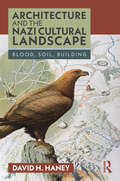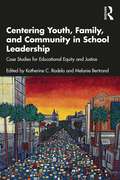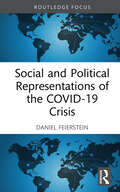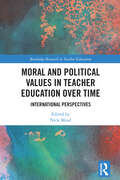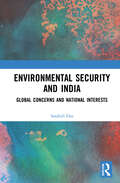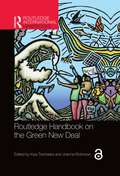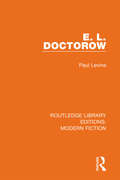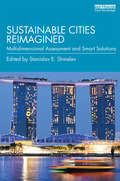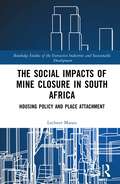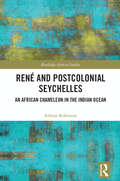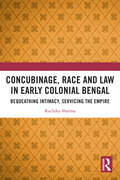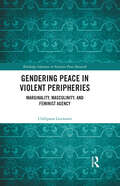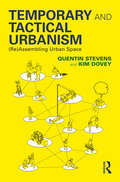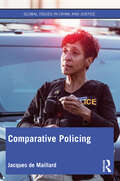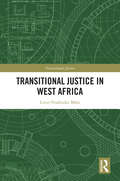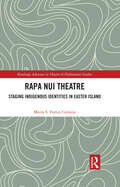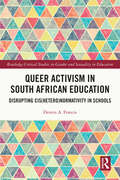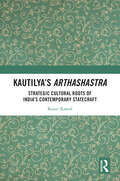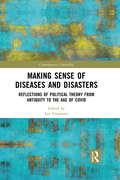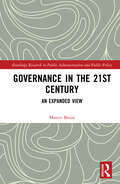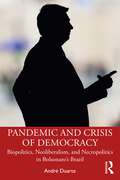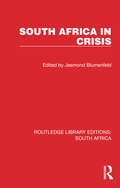- Table View
- List View
Architecture and the Nazi Cultural Landscape: Blood, Soil, Building
by David H. HaneyThis book traces cultural landscape as the manifestation of the state and national community under the Nazi regime, and how the Nazi era produced what could be referred to as a totalitarian cultural landscape.For the Nazi regime, cultural landscape was indeed a heritage resource, but it was much more than that: cultural landscape was the nation. The project of Nazi racial purification and cultural renewal demanded the physical reshaping and reconceptualization of the existing environment to create the so-called "new Nazi cultural landscape." One of the most important components of this was a set of monumental sites thought to embody blood and soil beliefs through the harmonious synthesis of architecture and landscape. This special group of "landscape-bound" architectural complexes was interconnected by the new autobahn highway system, itself thought to be a monumental work embedded in nature. Behind this intentionally aestheticized view of the nation as cultural landscape lay the all-pervasive system of deception and violence that characterized the emerging totalitarian state.This is the first historical study to consider the importance of these monumental sites together with the autobahn as evidence of key Nazi cultural and geographic strategies during the pre-war years. This book concludes by examining racial and nationalistic themes underlying cultural landscape concepts today, against this historic background.
Architecture and the Nazi Cultural Landscape: Blood, Soil, Building
by David H. HaneyThis book traces cultural landscape as the manifestation of the state and national community under the Nazi regime, and how the Nazi era produced what could be referred to as a totalitarian cultural landscape. For the Nazi regime, cultural landscape was indeed a heritage resource, but it was much more than that: cultural landscape was the nation. The project of Nazi racial purification and cultural renewal demanded the physical reshaping and reconceptualization of the existing environment to create the so-called "new Nazi cultural landscape." One of the most important components of this was a set of monumental sites thought to embody blood and soil beliefs through the harmonious synthesis of architecture and landscape. This special group of "landscape-bound" architectural complexes was interconnected by the new autobahn highway system, itself thought to be a monumental work embedded in nature. Behind this intentionally aestheticized view of the nation as cultural landscape lay the all-pervasive system of deception and violence that characterized the emerging totalitarian state. This is the first historical study to consider the importance of these monumental sites together with the autobahn as evidence of key Nazi cultural and geographic strategies during the pre-war years. This book concludes by examining racial and nationalistic themes underlying cultural landscape concepts today, against this historic background.
Centering Youth, Family, and Community in School Leadership: Case Studies for Educational Equity and Justice
by Melanie Bertrand Katherine C. RodelaThis timely book advances a new vision for educational justice centered on the leadership activities, organizing efforts, and counternarratives of youth, parents, families, and communities of color and other groups who are seeking to transform local schools and communities across the United States. Bringing together scholars, activists, and leaders, this contributed volume presents cases and first-person narratives for readers to analyze in order to interrogate inequities facing communities and schools. By creating spaces for youth, family, and community leadership within schools and opening decision-making to include their input, leaders can support transformative, justice-oriented school change. This book is a critical teaching tool asking educators and administrators to reflect, learn, and re-imagine their practice and collaborate with other leaders in their communities.
Social and Political Representations of the COVID-19 Crisis (The COVID-19 Pandemic Series)
by Daniel FeiersteinWeaving together political, sociological, psychological and epidemiological analyses, Social and Political Representations of the COVID-19 Crisis provides revealing insights into the transformations wrought by the pandemic and the social divisions it has exposed. Accounting for the realities of the pandemic across the globe, with a strong focus on experiences in the Global South, this book challenges readers to question their beliefs about the societies they live in and how these societies should respond to collective catastrophes. Originally published in Spanish, this English edition is thoroughly revised and updated. Social and Political Representations of the COVID-19 Crisis analyses the varied strategies attempted in different parts of the world to deal with the pandemic, including elimination, mitigation, flattening the curve, and herd immunity, and the ramifications of these approaches. It argues that the different strategies are guided by social representations that can be analysed on epistemological, emotional and ethical-moral levels. Drawing upon a wide range of thinkers, the book also investigates the key role of psychological defence mechanisms, including different ways of denying the seriousness of the pandemic and different paranoid responses to pain and frustration, such as scapegoating and conspiracy theories. This timely book analyses the transformations in the social fabric brought about by the pandemic and the questions it poses for the future of our societies. It will therefore be of great interest to students and researchers in the humanities, social sciences, and public health as well as the general reader.
Moral and Political Values in Teacher Education over Time: International Perspectives (Routledge Research in Teacher Education)
by Nick MeadThis collection brings together international teacher educators to employ a ‘long view’ of an historic and values-based dialectic in teacher education. The authors reflect how employing historical consciousness to look back can offer greater continuity to teachers’ moral and political values within their training. The book draws on research from experienced teacher educators representing different historical, social and political contexts in North America, Europe, Asia as well in post-conflict South Africa. Within each section, the authors reflect on the development of the moral and political values of pre-service and in-service teachers in an era of global neo-liberalism and how this is inextricably bound up with the narratives of professionals in the past within their own national context. Each chapter takes a ‘long view’ of the role of historical consciousness in informing the moral and political values of preservice and in-service teachers, providing examples of how international teacher educators can collectively support one another in restoring a vibrant, values-based dialectic within the processes, pedagogies and provision of university and school-based training for which they are responsible. The ‘long view’ approach offers a compelling argument for the need to connect pre- and in-service teachers’ values and narrative to the legacy of professionals of the past. Moral and Political Values in Teacher Education over Time will be of great interest to researchers, academics and students in teacher education, comparative education and the history of education. It will also be of interest to international university and school-based teacher educators and policy-makers in the field.
Environmental Security and India: Global Concerns and National Interests
by Satabdi DasThis book examines environmental issues through the lens of security studies and presents a comprehensive analysis of Indian policy in dealing with threats posed by climate change. This volume, • Puts forward theoretical base for securitization of environmental issues, incorporating different schools of thought; • Presents a survey of global environmental politics in general and the effects of climate change and its consequences for India's national security in particular; • Examines the politics involved in India's environmental policy at both the domestic and international level; • Outlines key policy takeaways and possibilities for action that can help contain the threat of environmental change. A comprehensive guide to a new and emerging dimension in Indian security policy, this book will be essential reading for students and researchers of international relations, security studies, especially non-traditional security, public policy, especially environmental policy, and area studies.
Routledge Handbook on the Green New Deal (Routledge International Handbooks)
by Kyla Tienhaara Joanna RobinsonIn recent years, the Green New Deal has moved from relative obscurity to front and centre of policy discussions and public debates about how to respond to the climate crisis. It has been credited with radically changing the nature of the conversation on climate change and with re-energizing the environmental movement at a critical time. All Green New Deal proposals share an emphasis on the need for governments (rather than markets) to lead the energy transition. However, they differ in other respects. This Handbook analyses the fundamentals underlying all Green New Deals as well as exploring national and regional variations. It is divided into three parts. The first part examines the political economy of the Green New Deal focussing not just on how proposals will be costed but also on opportunities for a fundamental transformation of both national economies and the global economic system. The second part explores issues of justice, which are central to many Green New Deal proposals, including Indigenous rights, racial and gender equity, and justice for the Global South. In the third part, authors detail case studies of Green New Deal proposals and plans at the local, national, and regional level. This book will be an invaluable research and reference volume for students and scholars in economics, politics, sociology, geography, and environmental studies. It should also be of interest to those actively involved in climate and environmental policymaking.
E. L. Doctorow (Routledge Library Editions: Modern Fiction #20)
by Paul LevineDuring his lifetime E. L. Doctorow was a remarkable phenomenon among contemporary American novelists. He was a serious writer who was popular, a political writer who was a stylist, an original writer who was highly eclectic and an historical writer who invented the past. In this study, originally published in 1985, Paul Levine follows Doctorow’s progress as a novelist and traces the development of certain themes that recur in his work including the relationships between history and imagination, between high and popular culture and between political content and radical style. He also examines Doctorow’s notion of the writer as witness and actor and of writing as a subversive activity, two concerns which link him with important writers in Europe and Latin America. The book should provide a valuable and comprehensive coverage of his work to date, including the films of Ragtime and The Book of Daniel.
Sustainable Cities Reimagined: Multidimensional Assessment and Smart Solutions
by Stanislav ShmelevTo assess urban sustainability performance, this book explores several clusters of cities, including megacities, cities of the Global South, European and North American cities, cities of the Middle East and North Africa, cities of Central and South East Asia, a city state of Singapore and a large group of global cities. It applies a multi-criteria approach using a panel of environmental, economic, social and smart indicators to assess progress and policies in global cities including London, New York, Hong Kong, San Francisco, Los Angeles, São Paolo, Rio de Janeiro, Buenos Aires, Paris, Berlin, Stockholm, Moscow, Beijing, Seoul, Singapore, Shanghai, Sydney, Tokyo and many others. Additional attention is given to the issues of climate change, poverty and smart dimensions, with renewable energy and the drivers of urban CO2 emissions playing the central role. This book is abundant with case studies considering strategies, policies and performance of the leading cities, including San Francisco, Stockholm and Seoul in greater depth, exploring how their successes can be used by other cities. The book identifies key linkages between different smart and sustainability dimensions as well as investment opportunities in cities with sustainability potential. This book will be of great interest to policy makers, city and regional authorities as well as scholars and students of urban planning and sustainable development aiming to facilitate a sustainability transition in our cities around the world.
The Social Impacts of Mine Closure in South Africa: Housing Policy and Place Attachment (Routledge Studies of the Extractive Industries and Sustainable Development)
by Lochner MaraisThis book investigates the relationship between mining, mine closure and housing policy in post-apartheid South Africa, using concepts from new institutional economics and evolutionary governance theory. Mine closures present a major challenge to the mining industry and governments, with this being particularly noticeable in the Global South. This book argues that the dependencies created by the mining industry and mine housing policies while a mine is operational cause serious societal problems when it closes. To demonstrate this, the book applies the concepts of place attachment, asset-based development and social disruption. Conceptually, the book challenges the view that place attachment and asset-based development are the most appropriate and often the only policy responses in mining areas. In South Africa, the mining industry and the government have created comprehensive housing programmes linked to homeownership to promote place attachment, stability and wealth among mine workers. These programmes do not consider the disruption that mine closure might bring. The book challenges the blind application, during boom periods, of policies which create long-term dependencies that are difficult to manage when a mine closes. This book will be of interest to students and scholars researching the social impacts of mining and the extractive industries, social geography and sustainable development, as well as policymakers and practitioners working with mine closure or social impact assessments.
René and Postcolonial Seychelles: An African Chameleon in the Indian Ocean (African Studies)
by Ashton RobinsonRobinson details the life and times of France-Albert René (1935–2019), the second post-independence leader of Seychelles who oversaw the nation’s transition to democracy after over a decade of his brutal dictatorship.René’s career was Seychelles’ history over the forty-three years from independence in 1976 until his peaceful death. Having seized power in a violent coup he presented himself as a socialist in the Cold War but transitioned to build Africa’s most successful relationship with international lenders and developed Seychelles as a major offshore tax haven. He also sustained and cultivated Seychelles’ position as a Western tourism-based economy. Robinson outlines not only René’s use of political violence and extrajudicial killing but also his unique relationship with transnational, organised crime including his links with the New York mafia, Italian organised crime interests and even helping to arm the Rwandan genocide. Nevertheless, René – a white leader of an African nation – avoided the self-isolation of Rhodesia and South Africa; endowed racial harmony; enabled women to advance politically and socially; and left Seychelles with high incomes, currency convertibility, and robust human and physical infrastructure.This is an essential read for anyone with an interest in the history of Seychelles, which will also be of great value to scholars of postcolonial states, African studies, microstates and the Indian Ocean region.
René and Postcolonial Seychelles: An African Chameleon in the Indian Ocean (African Studies)
by Ashton RobinsonRobinson details the life and times of France-Albert René (1935–2019), the second post-independence leader of Seychelles who oversaw the nation’s transition to democracy after over a decade of his brutal dictatorship. René’s career was Seychelles’ history over the forty-three years from independence in 1976 until his peaceful death. Having seized power in a violent coup he presented himself as a socialist in the Cold War but transitioned to build Africa’s most successful relationship with international lenders and developed Seychelles as a major offshore tax haven. He also sustained and cultivated Seychelles’ position as a Western tourism-based economy. Robinson outlines not only René’s use of political violence and extrajudicial killing but also his unique relationship with transnational, organised crime including his links with the New York mafia, Italian organised crime interests and even helping to arm the Rwandan genocide. Nevertheless, René – a white leader of an African nation – avoided the self-isolation of Rhodesia and South Africa; endowed racial harmony; enabled women to advance politically and socially; and left Seychelles with high incomes, currency convertibility, and robust human and physical infrastructure. This is an essential read for anyone with an interest in the history of Seychelles, which will also be of great value to scholars of postcolonial states, African studies, microstates and the Indian Ocean region.
Concubinage, Race and Law in Early Colonial Bengal: Bequeathing Intimacy, Servicing the Empire
by Ruchika SharmaThis book analyzes the domestic relations which British men came to establish with native Indian women in early colonial Bengal. It provides a fresh look into the history of imperial expansion and colonial encounters by studying the large number of wills left by the British men who came in an official or economic capacity to India. It closely engages with these wills, considering them as unique personal records. These documents, where the men penned down details of their native mistresses, give a glimpse of what their lives, interpersonal relationships, household objects, and everyday affairs were like. The volume highlights how commonplace such non-marital cohabitation was and constructs the social history of these connections. It looks at issues of theft, violence, rape, bequeathment, and property rights which the women had to contend with, and also studies some of the early experiences of the mixed-race children who were a product of these relationships. A unique look into the asymmetrical but fascinating history of interracial households in early colonial Bengal, this book will be of interest to students and researchers of history, women’s studies, gender studies, colonial law, colonial travel writing, minority studies, colonialism, imperialism, and South Asian studies.
Gendering Peace in Violent Peripheries: Marginality, Masculinity, and Feminist Agency (Routledge Advances in Feminist Peace Research)
by Uddipana GoswamiThis book forwards Assam (and Northeast India) as a specific location for studying operations of gendered power in multi-ethnic, conflict-habituated geopolitical peripheries globally. In the shifting and relational margins of such peripheral societies, power and agency are constantly negotiated and in flux. Notions of masculinity are redefined in an interlaced environment of militarization, hyper-masculinization, and gendered violence. These interconnections inform victimhood and agency among the most vulnerable marginalized constituencies – namely, women and migrants. By centering the marginalized in its inquiry, the book analyzes obstacles to achieving positive, organic peace based on cooperation and mutual healing. The tools used to perpetuate an endless cycle of violence that makes conflict a habit – a way of life – are identified in order to enable resistance against them from within the margins. Such resistance must be based on reflexivity and strategic, cautious radicalism. This involves critically interrogating the inherent connections between engendered pasts and feminist futures, local changes and global contexts, as well as between small, incremental changes and big shifts impacting entire societies, nations, and global orders. This book will be of much interest to students of ethnic conflict, conflict resolution, feminist peace, and Asian/South Asian politics.
Temporary and Tactical Urbanism: (Re)Assembling Urban Space
by Quentin Stevens Kim DoveyTemporary and Tactical Urbanism examines a key set of urban design strategies that have emerged in the twenty-first century. Such projects range from guerrilla gardens and bike lanes to more formalised temporary beaches and swimming pools, parklets, pop-up plazas and buildings and container towns. These practices enable diverse forms of economic, social and artistic life that are usually repressed by the fixities of urban form and its management. This book takes a thematic approach to explore what the scope of this practice is, and understand why it has risen to prominence, how it works, who is involved, and what its implications are for the future of city design and planning. It critically examines the material, social, economic and political complexities that surround and enable these small, ephemeral urban interventions. It identifies their short-term and long-term implications for urban intensity, diversity, creativity and adaptability. The book's insights into temporary and tactical urbanism have particular relevance in the context of the COVID-19 pandemic, which has highlighted both the need and the possibility of quickly transforming urban spaces worldwide. They also reveal significant lessons for the long-term planning and design of buildings, landscapes and cities.
Comparative Policing (Global Issues in Crime and Justice)
by Jacques de MaillardThis book is a systematic and comparative analysis of police systems in the Western world, looking at their structure and how they tackle contemporary social problems, such as economic austerity, multi-level governance, transnational change, relations with minorities and transformation of delinquency. Core content includes: • Comparative histories of the formation of national police systems; • A discussion of centralised and decentralised police systems; • International differences in community policing; • A review of different police strategies in fighting delinquency and reducing urban disorder; • A comparative analysis of different ways of controlling police misconduct; • An exploration of different models of plural policing. While other books focus on policing in relation to measures effective in decreasing delinquency and augmenting security, this book considers the political, professional, administrative and political economic parameters which frame and shape the course of police reforms. It also explores how operational policing is shaped by the cultural and institutional contexts in which it is located. It is essential reading for students engaged in international police studies and comparative criminal justice.
Transitional Justice in West Africa
by Linus Nnabuike MaluThis book explores the challenges of transitional justice in West Africa, specifically how countries in the region have dealt with transitional justice problems in the last 30 years (1990–2020), and how they have managed the process. Using comparative, historical, and legal analyses it examines the politics of justice after violent conflicts in West Africa, the major transitional justice mechanisms established in the region, and how countries have used these institutions to address injustice and the pains of war in some West African countries. The book examines how transitional justice mechanisms have contributed to victims’ rights, reconciliation, and peace in transitional societies, and whether transitional justice mechanisms deployed in West Africa were suitable or ill-fitted, and the politics of deploying them. The book is addressed to a wide audience: policymakers, and graduate and post-graduate students of transitional justice, conflict resolution, peace studies, conflict transformation, international criminal law, law and similar subjects. This book will be of great value to academics and researchers, as well as lecturers in tertiary institutions offering relevant courses; legal practitioners; peace practitioners/NGOs; and those working in the field of transitional justice and human rights.
Rapa Nui Theatre: Staging Indigenous Identities in Easter Island (Routledge Advances in Theatre & Performance Studies #1)
by Moira Fortin CornejoThis book examines the relationships between theatrical representations and socio-political aspects of Rapa Nui culture from pre-colonial times to the present. This is the first book written about the production of Rapa Nui theatre, which is understood as a unique and culturally distinct performance tradition. Using a multilingual approach, this book journeys through Oceania, reclaiming a sense of connection and reflecting on synergies between performances of Oceanic cultures beyond imagined national boundaries. The author argues for a holistic and inclusive understanding of Rapa Nui theatre as encompassing and being inspired by diverse aspects of Rapa Nui performance cultures, festivals, and art forms. This book will be of great interest to students and scholars of Indigenous studies, Pacific Island studies, performance, anthropology, theatre education and Rapa Nui community, especially schoolchildren from the island who are learning about their own heritage.
Queer Activism in South African Education: Disrupting Cis(hetero)normativity in Schools (Routledge Critical Studies in Gender and Sexuality in Education)
by Dennis A. FrancisOffering a vital, critical contribution to debates on gender, sexuality and schooling in South Africa, this book highlights how South African educational practices, discourses and structures normalize cisheteronormativity, along with how these are resisted within schools and through contemporary forms of activism. Not only does it add fresh insights to the existing research literature on gender, sexualities and schooling, it also underscores the valuable contributions of queer and transgender social movements, which have made influential legislative, teaching, learning and support contributions to education. Drawing on ethnographic research with queer and transgender activists, teachers, school managers, parents and school attending youth, the book provides everyday real-life quotes and observations offering a deeply critical contribution to the debates on gender and sexualities, education and activism. Using spatial and affect theories, it troubles the assumptions that frame this field of research to make a novel contribution to the national and international literature and research. The book provides research-based insights for thinking about and calls for informed action to challenging cisheteronormativity within and beyond schools.
Kautilya’s Arthashastra: Strategic Cultural Roots of India’s Contemporary Statecraft
by Kajari KamalThis book studies India’s foreign policy through the lens of Kautilya’s Arthashastra, an ancient Indian treatise on state and statecraft. It assesses the extent of influence of the foundational elements/core beliefs extrapolated from the Arthashastra on the nation’s international behaviour to understand the grand strategic preferences of independent India. The volume examines the basic realist and cultural underpinnings of statecraft such as Yogakshema (Political End Goal), Saptanga (Seven Elements of State), Sadgunyas (Six Measures of Foreign Policy), Rajdharma (Duty of a King), Rajamandala (Circle of kings), and Dharma (Order), mooted in the Arthashastra which have withstood the test of time and space. It evaluates the continuity of strategic cultural traits under the themes of nonalignment, bilateral relations with China and Pakistan, and nuclear policy. An important intervention in the study of India’s foreign policy, the book will be useful for scholars and researchers of foreign policy, defence policy, international relations, defence and strategic studies, political science, Indian political thought, political philosophy, classical literature, and South Asian studies.
Making Sense of Diseases and Disasters: Reflections of Political Theory from Antiquity to the Age of COVID (Contemporary Liminality)
by Lee TrepanierThis book examines diseases and disasters from the perspective of social and political theory, exploring the ways in which political leaders, social activists, historians, philosophers, and writers have tried to make sense of the catastrophes that have plagued humankind from Thucydides to the present COVID pandemic. By adopting the perspective of political theory, it sheds light on what these individuals and events can teach us about politics, society, and human nature, as well as the insights and limitations of political theory. Including thinkers such as Thucydides, Sophocles, Augustine, Bacon, Locke, Hume, Rousseau, Publius, Bartolomé de las Casas, Jane Addams, Camus, Saramago, Baudrillard, Weber, Schmitt, Voegelin and Agamben, it considers a diverse range of events including the plagues of Byzantium and 14th century Europe, 9/11, the hurricanes of Fukushima, Boxing Day, and New Orleans, and the current COVID pandemic. An examination of past, present, and future diseases and disasters, and the ways in which individuals and societies react to them, this volume will appeal to scholars of politics, sociology, anthropology and philosophy with interests in disaster and the social body.
Governance in the 21st Century: An Expanded View (Routledge Research in Public Administration and Public Policy)
by Morris BosinIn Governance in the 21st Century, Morris Bosin offers an integrated approach in addressing real world governance challenges.Divided into four broad sections, Bosin begins in Part 1 by introducing the nature of governance, its use in the public and private sector, and at different levels in our society. Part 2covers traditional and emerging approaches to governance and reviews the various epistemological roots that frame our understanding of governance approaches. Part 3 includes a detailed discussion of the three components of his proposed approach to an expanded view of governance – requisite variety, complexity, and reflexivity. Part 4 illustrates the application of this approach through the use of case studies targeted at selected Federal agencies as well as at specific societal issues including the FDA's Drug Review Program, Bureau of Indian Education Program, U.S. Customs and Border Protection, COVID 19, and Police Department Strategies.Crossing traditional disciplinary lines, Bosin’s integrated approach will guide the academic community as well as practitioners toward a more holistic view of governance and offer generic solutions that can be adapted to any number of issues that portend transformational change for society.
Governance in the 21st Century: An Expanded View (Routledge Research in Public Administration and Public Policy)
by Morris BosinIn Governance in the 21st Century, Morris Bosin offers an integrated approach in addressing real world governance challenges. Divided into four broad sections, Bosin begins in Part 1 by introducing the nature of governance, its use in the public and private sector, and at different levels in our society. Part 2covers traditional and emerging approaches to governance and reviews the various epistemological roots that frame our understanding of governance approaches. Part 3 includes a detailed discussion of the three components of his proposed approach to an expanded view of governance – requisite variety, complexity, and reflexivity. Part 4 illustrates the application of this approach through the use of case studies targeted at selected Federal agencies as well as at specific societal issues including the FDA's Drug Review Program, Bureau of Indian Education Program, U.S. Customs and Border Protection, COVID 19, and Police Department Strategies. Crossing traditional disciplinary lines, Bosin’s integrated approach will guide the academic community as well as practitioners toward a more holistic view of governance and offer generic solutions that can be adapted to any number of issues that portend transformational change for society.
Pandemic and Crisis of Democracy: Biopolitics, Neoliberalism, and Necropolitics in Bolsonaro’s Brazil
by André DuarteIn this incisive book, André Duarte examines the health crisis resulting from the COVID-19 pandemic and the contemporary crisis of democracy. Reflecting on President Jair Bolsonaro’s misgovernment of Brazil, as evidenced by his political actions, speeches and omissions from March 2020 to September 2021, and using concepts like biopolitics, neoliberalism and necropolitics, Duarte proposes three interrelated hypotheses to demonstrate Bolsonaro's sharp distrust of democracy. First, that Bolsonaro’s rhetoric, actions and omissions during the first year and a half of the pandemic revealed a dangerous mixture of biopolitical, neoliberal and necropolitical governmentality strategies. Second, that the pandemic in Brazil intensified the damaging side-effects against democracy brought by neoliberalism and biopolitics, once the necropolitical vector assumed precedence. And third, that Bolsonaro’s political agenda is either to revoke the Brazilian democracy by violent means or to implement a façade democracy by slowly distorting it from within, blurring the differences between democracy and authoritarianism. Conceptualizing democracy as power of the demos and not exclusively as a political regime organized around a definite set of political institutions, Duarte argues that Bolsonaro's misgovernment of Brazil is related to his antidemocratic viewpoints. Pandemic and Crisis of Democracy is an important book for researchers, students, and anyone concerned about the dangers that surround the democratic experience in the contemporary world.
South Africa in Crisis (Routledge Library Editions: South Africa #1)
by Blumenfeld JesmondOriginally published in 1987, South Africa in Crisis documents the perceptions and policies of all the major interest groups in South Africa during the 1980s when the long-running struggle for ultimate political power in South Africa entered a new phase. It analyses their responses to the state of ferment and vicious circle of political and economic decline which ensued in the anti-apartheid struggle and examines the developing pressures both from within and outside the country. Of particular importance for the process was the relationship between internal reactions to the crisis and the diverse and unprecedented set of political, military and economic pressures which were interjected from abroad.
